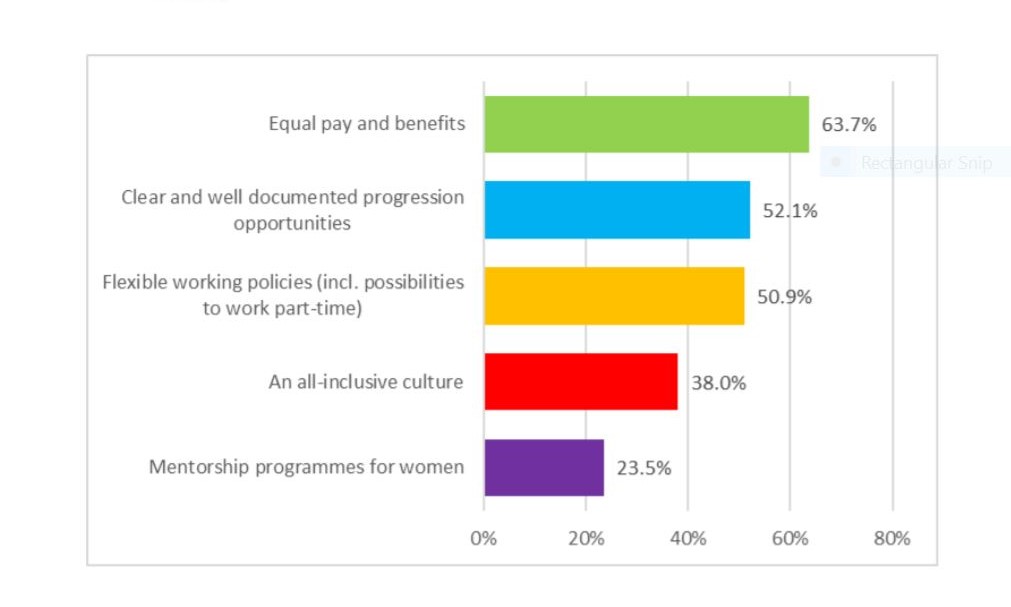Caroline Ramade is on a mission to double the number of #WomenInTech
Caroline Ramade, CEO & Co-Founder of 50inTech speaks to The Freelance Informer on why recruitment has got it wrong for so long when it comes to attracting and retaining #WomenInTech.
Caroline Ramade is calling in for backup. Anyone on a mission such as hers would. On the home front and in the field. Ramade is CEO and founder of 50intech, a networking and recruitment platform, accelerator, and software start-up that aims to accelerate the businesses and careers of women in tech- everywhere.
The week we spoke, Ramade had escaped to her countryside home, thanks to the lifting of France’s domestic travel ban, and her husband, who she says is her “50-50 partner” in all things career and family life. The number 50 is rather symbolic for the French tech entrepreneur and accelerator manager – it is the equaliser; the percentage; the optimal balance of men and women representing the global tech workforce. Alongside industry leaders, she and fellow co-founder and start-up veteran Gaëlle Legoff believe this 50:50 equilibrium will propel the tech industry to new heights. According to Ramade’s estimations, just 20 % of the tech workforce are women. She and Legoff’s mission is to more than double that statistic.
It is then apt to learn that after some quality family time in the countryside, her husband is taking the kids back to Paris so that she can have a rare work week ‘sans enfants’ and home-schooling to focus on the launch of 50inTech’s Software as a Service (SaaS), conduct Zoom investor meetings, manage the company’s FemTech accelerator, all the while promoting the #WomenInTech and #TechHerOn campaigns. To add to the spinning plates, Ramade is doing her bit by caring for some of the family’s adopted pets.
Much like her support network in her personal life, Ramade sees the value that support networks can provide women in tech and the larger economy. The problem is most networks in the tech industry aren’t working for women. They, unfortunately, can contain bias, assumptions of women’s abilities and their contribution potential. The tech network at-large is mostly made up of white males, says Ramade. Yet the target audience of most technology is not just white and male.
Eve-olution: what tech has been missing
Half the population is female, yet today’s technology products and services are only getting 20% or less of female input. That’s just bad business. That is why women have to look for networks that embrace ideas and skills from a female perspective and skills base, Ramade suggests.
The objective of Ramade’s business and new software is to recruit more women in tech with industry decision-makers and shakers committed to the company’s mission. Those that have put their hands up include Slack EMEA, Scaleway, Criteo, and Toucan Toco to name a few.
50inTech’s platform is a networking site that matches mentors, recruiters and hiring companies with candidates based on mutual interests, objectives, and skill sets (what candidates can provide and equally what they are looking for), but in a much more immediate and approachable way.
Hiring companies on the platform will also take a renewed approach to attract and retain the best female talent by offering the benefits and opportunities that matter the most, such as flexible hours and/or remote working, mentoring, gender-neutral roles, and networking.
The company has an impressive group of ambassadors, such as consultant and entrepreneur Cindy Gallop (We are Rosie) and Brian Solis, Salesforce’s Global Innovation Evangelist, with partners, including Engie CEO Isabelle Kocher and Microsoft for Startups CTO in residence (UK) Ian Mac Donald.
One of the drivers behind 50inTech’s strategy is to improve the recruitment technique for women in tech. In the latest Ivanti Women in Tech survey, for example, it was reported that 51% of respondents were attracted to companies with policies that enabled flexible or part-time working.
Has the elephant left the building?
The elephant in the room – the lack of institutionalised flexible and remote working – has long been at the crux of the problem in retaining women in the tech industry and pretty much every other sector. For many women, especially those in the time-sensitive and consuming tech sector, a lot of the demands of childcare and domestic duties fall on them even in a two-income household. Often, the responsibility has fallen on the woman in the partnership because their work is less valued- literally- since gender pay equality is so out of whack. The pandemic has exacerbated this dirge for some and brought on a newfound balance of duties and appreciation for others.
“Find the right partner in life,” says Ramade, “Look, look and look some more. It has to be a 50-50 partnership, especially if you wish to raise children together.”
It has been well documented that companies are failing to adequately attract and retain female talent. When asked why women’s professional growth is often slower than their male counterparts’, 62% of respondents in Avanti’s annual Women in Tech survey cited that stereotypes still favour men in leadership roles and that men and women in similar roles are judged by different criteria. Nearly two in three (64%) stated that equality in pay and benefits is the main factor that would attract them to a new role, while 46% suggested the industry still needs to close the gender pay gap to encourage more women into the industry.
After ten years working in the sector, the promotions were side-lined, female candidates were overlooked and not even asked to contribute their insights, talked over in meetings, and women slowly but surely moved out of tech much to the loss of the industry. Not all, but too many to ignore.

It’s about time
The greater acceptance for remote working whether as a permanent employee, freelancer, self-employed project manager, or contractor now opens the pool of diverse talent wide open. What many people may not realise is that women make up a greater percentage of computer science graduates in countries such as China, Tunisia, India and Russia than in many western European countries. Perhaps it comes down to culture, the education system, or how technology is seen as gender neutral or even encouraged as a female-friendly occupation (since it can be done at home)?
Companies are scratching their heads to understand what they have been missing to double their growth and user numbers. The answer according to Ramade is simple: women. The ‘other half’ of the growth formula that tech companies have been not been exposed to when it comes to building and developing their businesses and products.
Ramade sees the recent work-from-home ‘experiment’ across the globe that spurred from the COVID-10 pandemic as a catalyst for women to reassess their career trajectory in their current company and have the courage to leave a toxic workplace or unsupportive.
“Women in tech are precious, they are rare, and there is a talent shortage, so there is no reason for them to stay in a toxic company,” says Ramade.
“The rise of remote working means tech companies have fewer excuses not to hire women and more incentives to do so. There’s never been a better time to hire women in the tech sector,” she says.



